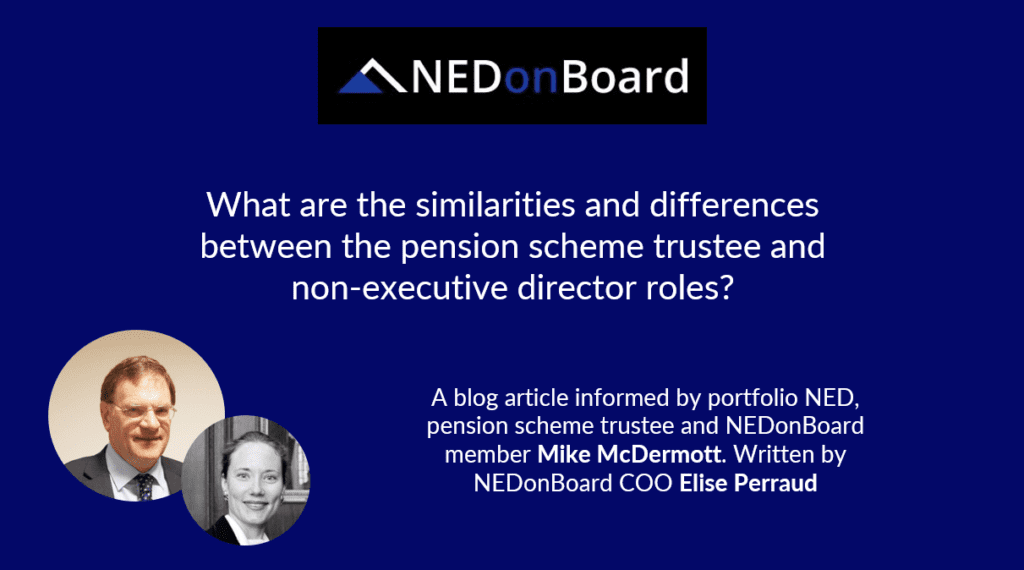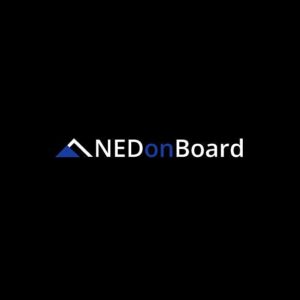What are the differences between pension trustee and NED? Can a pension trustee be a non-executive director? In this blog article, NEDonBoard explores the role of the pension scheme trustee and outlines the similarities between the roles of pension scheme trustee and non-executive director. Both roles sit well in a portfolio of board positions. NEDonBoard thanks Mike McDermott, portfolio NED and pension scheme trustee for his insights, which informed this blog article.
Background
The trustee board is responsible for the governance of the pension scheme. The board has a duty to ensure that fit-for-purpose processes, systems, people, and procedures are in place to manage the scheme, its investments, and risks. Pension scheme trustees are there to act in the best interests of scheme members.
Boards of directors are responsible for the governance of their companies. As per the UK Corporate Governance Code, boards “promote the long-term sustainable success of the company, generating value for shareholders and contributing to wider society”.
Pension trustees are responsible for the proper running of the scheme, from the collection of contributions, to the investment of assets and payment of benefits.
What are the similarities between the roles of non-executive director (NED) and pension scheme trustee?
Both roles are guided by codes of governance and carry a duty to act in the best interests of your pension members or stakeholders in a company. Financial matters are important in both roles: while boards approve the accounts, pension trustee boards review the position of the schemes and make decisions on their future. Non-executive directors and pension scheme trustees are accountable for the proper running of their organisation.
Conflicts of interest need to be dealt with in all non-executive roles. Potential conflicts must be declared and dealt with promptly.
“Conflicts of interest may be more prevalent in pension funds as many trustees are also employees of the sponsoring employer and may have funds within the pension scheme itself.”
What are some important differences?
Pension scheme trustees are concerned with the pensions that the members receive. They look at achieving the best return on investments for their members. Financial and numeracy skills are crucial to be an effective pension scheme trustee as there are some technical financial elements such as the actuarial calculations. While non-executive directors also need an understanding of financial matters, the role typically requires less technicality.
Pension scheme trustees are concerned with the financial position of the scheme but not only. They are also concerned with the sustainable long-term performance of the sponsoring company, who makes contribution into the scheme.
Pension scheme trustees may be more reliant on their advisors than non-executive directors, particularly in smaller schemes. Pension advisers provide advise with regards to investment and actuarial assumptions and calculations.
The composition of boards and considerations around diversity are also differences:
“Diversity is the issue that pension scheme struggle with, especially small schemes. Their trustee boards may comprise employer nominated trustees and member nominated trustees, so potentially, all board members are part of the sponsoring company. Independent trustees are growing, but small schemes typically don’t have independent trustees”.
To which extent does a NED role complement a pension scheme trustee role? Does being a non-executive role helpyou in being more effective as a pension trustee?
Pension scheme trustee and non-executive director roles are complementary. Both roles are about challenge. The insights you gain from one role can be transferred to the other. This is why pension scheme trustee may consider their transition to non-executive directorship as they can be successful, effective and sought-after.
What recommendations for pension trustees wanting to transition to non-executive directorship?
“Use your time in the pension scheme boardroom wisely. There are a lot of similarities. You need to be capable of analysing the board papers and the financials. You should also keep your training and CPD up to date and be prepared to participate and challenge”.
Mike McDermott is an experienced chair and non-executive director, currently sitting on the board of Jigsaw Homes Midlands, which is part of the Jigsaw Homes Group. He is also a trustee of a pension scheme (Melton Mowbray Building Society Pension Scheme) and a governor of a secondary academy. His previous board experience includes chair of a pension scheme and a non-executive director and chair of a building society.
The interview was facilitated by Elise Perraud, NEDonBoard COO who authored this article.
NEDonBoard has partnered with the Pensions Management Institute (PMI) to offer PMI members non-executive and board training courses. Please email [email protected] for information.
Additional resources:
Differences and similarities between commercial NED and trustee roles
Is a non-executive director the same as a trustee?
What are the key differences between an executive and a non-executive director?
New to the NED role? We encourage you to watch the NEDonBoard webinar How to secure your first NED role (registration link).
Looking to source NED roles, expand your network and knowledge? Sign-up to our membership to attend our events, access the jobs board and many other resources.




